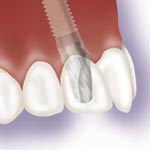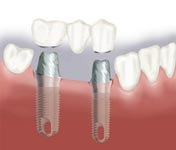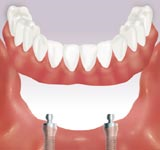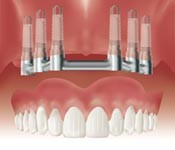Dental Implants
The modern method of replacing missing teeth. Research shows that 85% of people who wear full or partial dentures experience some related discomfort and difficulty. Dental implants can eliminate those problems, restore self-confidence and improve the quality of life. From a single missing tooth to an entire set of teeth, dental implants can provide a permanent alternative to problem dentures, and help prevent the premature loss of remaining teeth. Dental implants can last a lifetime and are an excellent investment in oral health.
Q: What are dental implants?
A: Dental implants are made of biocompatible materials that become directly attached to your jawbone. In dental terms, this is called "osseointegration." Once anchored in place, your implants can be used to replace a missing tooth, support an entire set of teeth or retain an overdenture. The result is a natural type of tooth replacement that can restore the biting and chewing ability you once enjoyed, improve your appearance and renew your self-confidence.
Q: What procedures are used to insert dental implants?
A: Placement of dental implants is a minor surgical procedure performed in one or two office visits. If you have one-stage implants, their metal tops will extend through the gums while your tissues heal, and you will not need a second surgery. If you have two-stage implants, they will be placed under the gums while the bone heals. You will need a second, simple surgery to uncover them and attach a post to support your replacement teeth. Your dentist's decision to do a one- or two-stage surgical procedure depends on a number of clinical factors, such as the amount of available bone and location of the implants. After the implants are placed, the bone attaches to them and permanently anchors them within your jaw. In the meantime, your dentist may adjust your full denture or partial prosthesis for temporary use.
Restoration
Q: What restorations can dental implants provide?



